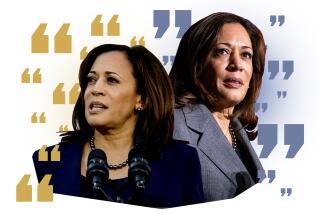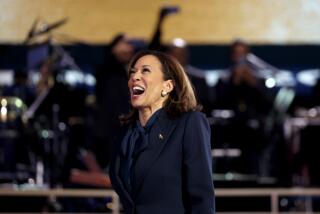NEWS ANALYSIS : Hillary-Bashing Becoming a Part of GOP Campaign : Strategy: She’s accused of urging ‘radical feminism,’ trying to destroy the family. But attacks may be risky.
- Share via
LITTLE ROCK, Ark. — Barbara Bush may not like it but if the Republican Convention is any indication, Hillary-bashing is about to become a fixture of the presidential campaign.
Hillary Clinton, the high-powered, articulate and liberal wife of Democratic nominee Bill Clinton, has rapidly become the woman Republicans love to hate. The status has some irony, for it mimics the history of Eleanor Roosevelt, the woman after whom Mrs. Clinton has often said she would like to model herself if her husband makes it to the White House.
Monday night, Patrick J. Buchanan took off after Hillary Clinton, repeating charges that GOP Chairman Richard N. Bond had made last week--that she has “likened marriage and the family to slavery.” Television cameras caught Mrs. Bush, who had criticized Bond’s statement, looking perturbed and muttering to a companion during Buchanan’s remarks, but GOP strategists predict more such criticism to come.
Hillary Clinton may find herself in the spotlight again tonight, designed by GOP strategists as “family values night” and featuring speeches from Mrs. Bush and Vice President Dan Quayle’s wife, Marilyn.
The focus of the attacks has been on Clinton’s legal writings, with Buchanan, Bond and other Republican spokesmen accusing her of advocating “radical feminism” and seeking to undermine the family. “What does Hillary believe?” Buchanan demanded in his speech, going on to say that she believes “12-year-olds should have the right to sue their parents.”
Those attacks constitute a potentially high-risk strategy: Attacking a presidential candidate’s spouse marks a new wrinkle in politics that many voters--particularly younger, more affluent women--may dislike. Moreover, the attacks, even by the somewhat loose standards of presidential campaigns, fairly seriously distort what Mrs. Clinton has written.
Even some Republicans question the approach. One GOP strategist noted that private research has indicated that voters impose an “extremely high standard of proof” on allegations that a candidate’s wife is a legitimate issue.
Democrats have reacted with outrage. “Since when do you run for President by attacking a guy’s wife?” demanded Clinton campaign press secretary Dee Dee Myers.
The answer, Republican operatives argue, is that Hillary Clinton is one of her husband’s closest advisers. Her views may help shape his, they say. Or, they suggest, perhaps her views indicate ideas that her husband may really hold but would prefer not to talk about.
And despite the risks, the attacks on Mrs. Clinton fit into a basic Republican strategy--trying to find ways to pierce Bill Clinton’s carefully portrayed moderate stance and to convince voters that he is nothing but a new-style Democratic liberal in disguise.
As Clinton pollster Stanley Greenberg noted, the targets of nearly all such GOP strategies have been two groups whose defection to the Democratic ticket--if it holds up--would sink Bush’s candidacy irretrievably: older white Southerners and Northern, blue-collar ethnic groups. Both groups are generally conservative on cultural issues and presumed to be suspicious of well-paid, independent-minded women lawyers.
For most of the last two decades, Hillary Clinton has worked on issues of child welfare and education, serving until recently, for example, as chair of the Children’s Defense Fund, which has often lobbied for increased federal spending on children’s programs. In Arkansas, she chaired a task force that devised new statewide education standards.
She also introduced into the state--and the country--a preschool literacy program devised in Israel that won favorable attention in a handbook on literacy published in 1989 by the Barbara Bush Foundation for Family Literacy.
The attacks, however, have focused not on those activities, but on a series of legal articles she wrote in the late 1970s and early 1980s in which she advocated changes in the way children are treated in courts and other legal forums.
It was a subject that Mrs. Clinton knew could be controversial. “The very questions being asked invite fear and confusion,” she wrote in one 1977 article. “They touch deeply held and often conflicting convictions about family autonomy and childhood needs.”
Indeed they have. In a 1973 article on “Children Under the Law,” for example, she sought to explain the history behind the legal principles that limit the rights of children. Those limits, she noted, are based on the idea of dependency: “that certain individuals are incapable or undeserving of the right to take care of themselves and consequently need social institutions specifically designed to safeguard their position.”
“Along with the family, past and present examples of such arrangements include marriage, slavery and the Indian reservation system,” she wrote. “The relative powerlessness of children makes them uniquely vulnerable to this rationale.”
That passage is the basis for the GOP charge that she compared marriage to slavery.
Under laws of many countries throughout history--including the United States until modern times--married women had few legal rights and were considered legally dependent upon their husbands. In the 19th Century, married women in some states were forbidden to own property in their own names or to file lawsuits. And it was not until the early 1970s that the Supreme Court struck down state laws requiring a married woman to live wherever her husband chose or risk being charged with abandonment.
Mrs. Clinton’s basic argument in 1973 was that courts should stop assuming that all children are legally incompetent until they suddenly become fully competent at the age of majority--the traditional legal view. Instead, she argued, courts and other government bodies should take a more case-by-case approach, assuming that children are competent to advance their own views unless evidence indicates the contrary.
“There are certain children at certain ages in certain circumstances who can and should exercise responsibilities. The task is to determine what those conditions are,” she wrote.
Although anyone would agree that a newborn lacks competency to advance its own views, “it is more difficult to prove a 12-year-old child totally incompetent,” she wrote. That passage provides the basis for Buchanan’s assertion that she would allow children to sue.
Mrs. Clinton’s view was on the advance edge of theories on children’s rights in the early 1970s. Since then, however, laws and court decisions have generally headed in the direction she suggested.
Courts, for example, increasingly consult children--at least older ones--about their preferences before deciding custody in divorces. And the Supreme Court has upheld the right of a teen-age girl to obtain an abortion without obtaining permission from her parents. And courts have upheld the right of teen-agers, in some cases, to go to court to obtain permission for actions that their parents would forbid--obtaining needed surgery that a parent might find objectionable on religious grounds, for example.
Conservative legal commentators have found many of those developments disturbing, arguing that government should have no right to interpose itself between parent and child.
Mrs. Clinton has argued that although such intervention should be rare, some circumstances warrant it.
“Even among persons in the children’s rights movement, there is concern that extending rights to children against their parents is too difficult to control, and in all but the most extreme cases such questions should be resolved by the courts,” she wrote in a 1982 essay. Intervention should be “limited to decisions that could have long-term and possibly irreparable effects if they were not resolved.”
In such cases, she wrote, “children should have a right to be permitted to decide their own future if they are competent.”
More to Read
Get the L.A. Times Politics newsletter
Deeply reported insights into legislation, politics and policy from Sacramento, Washington and beyond. In your inbox twice per week.
You may occasionally receive promotional content from the Los Angeles Times.










